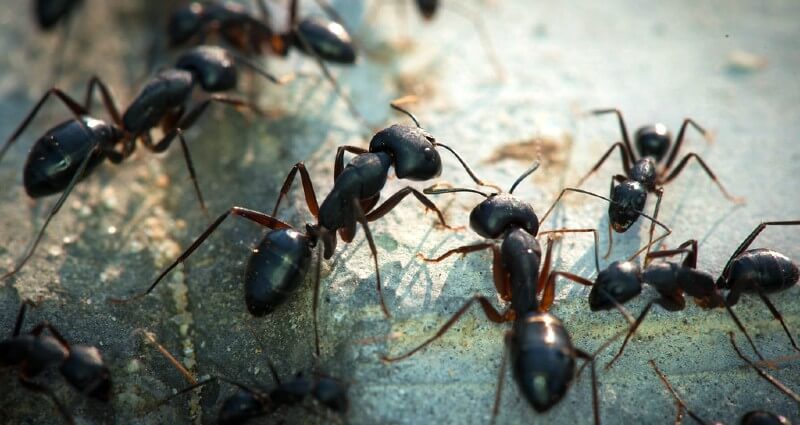Ecological Impact of Insect Control: Harmonizing Efficiency With Sustainability
The ecological influence of insect control is a critical issue that needs a fragile equilibrium between attaining efficiency in managing bugs and guaranteeing sustainability of our ecosystems. From the use of unsafe chemicals that permeate into our dirt and water to the unintentional repercussions on non-target types, the repercussions of traditional parasite control methods are significant.
Damaging Chemicals in Pest Control
The application of harmful chemicals in insect control poses significant ecological and health and wellness risks that require mindful consideration and reduction strategies. Pesticides, chemicals, and herbicides are commonly used to remove parasites, however their extensive application can cause unintentional consequences. These chemicals can pollute soil, water resources, and the air, influencing not just the targeted parasites but also helpful bugs, wild animals, and human beings.

To attend to these dangers, incorporated parasite management (IPM) strategies are being advertised as a more lasting option. IPM includes a combination of methods such as biological control, environment adjustment, and the targeted usage of pesticides as a last option (ant control pineville nc). By embracing an alternative technique to pest control, we can minimize the ecological and health and wellness influences related to hazardous chemicals while successfully handling pest populations
Impact on Non-Target Species
Considering the unplanned effects of bug control methods, the effect on non-target species is a critical element that calls for extensive examination. While bug control steps aim to target details parasites, various other microorganisms in the community might be inadvertently impacted. Non-target types, consisting of beneficial pests, birds, animals, and even plants, can experience indirect or straight harm from pesticide applications or organic control techniques.
Pesticides made to deal with a particular bug bug might harm pollinators like bees or natural predators such as ladybugs. Biological control agents, if not species-specific, can position risks to unintended targets, interfering with the eco-friendly balance.
To reduce the impact on non-target species, incorporated parasite administration (IPM) methods that highlight an alternative approach to pest control are advised. These methods focus on making use of ecologically friendly techniques, reducing injury to helpful microorganisms while efficiently handling pest populaces. Conducting thorough threat evaluations and monitoring the results of pest control initiatives are important action in safeguarding non-target varieties and promoting total environment wellness.
Soil and Water Contamination
Unintended environmental repercussions of insect control techniques expand beyond affecting non-target types, with considerable ramifications for soil and water contamination. Chemicals, herbicides, and chemical fertilizers made use of in parasite control can seep into the dirt and pollute groundwater, presenting a threat to both terrestrial and aquatic ecological communities. Dirt contamination can interfere with the balance of microbes important for vitamins and mineral cycling and plant growth, causing decreased soil fertility and efficiency. Moreover, these chemicals can continue the setting for extended durations, building up in the dirt and potentially going into the food web.
Water contamination is one more crucial issue linked with bug control practices. To reduce soil and water contamination from bug control tasks, integrated pest administration strategies that prioritize sustainability and decrease chemical inputs are vital.
Air Pollution From Pesticide Usage
Direct exposure to air-borne pesticides throughout farming applications poses a substantial problem for air pollution control actions. Additionally, pesticide drift, where pesticides are brought by the wind to unintentional locations, can lead to the contamination of close-by communities and water bodies.

Strategies for Sustainable Pest Control
In the world of agricultural methods, applying sustainable insect control strategies is critical for maintaining environmental balance and safeguarding plant yields. Sustainable bug control stresses using eco-friendly techniques to take care of bug populaces successfully while reducing injury to non-target microorganisms and ecological communities. Integrated Bug Monitoring (IPM) is a commonly taken on approach that incorporates biological, social, physical, and chemical control techniques to accomplish long-lasting insect administration services.
Crop turning and diversity are also reliable techniques to disrupt pest life cycles and develop less beneficial conditions for insects to thrive. Eventually, by integrating these sustainable parasite control strategies, farmers can achieve a balance in between pest administration performance and ecological stewardship.
Conclusion
To conclude, the environmental impact of pest control approaches need to be very carefully taken into consideration to balance efficiency with sustainability. Damaging chemicals made use of in bug control can lead to dirt and water contamination, air contamination, and injury non-target species - termite control services. It is critical to carry out sustainable bug control methods to lessen these negative impacts on the environment and promote a healthier environment for future generations
By embracing an alternative method to pest control, we can lessen the ecological and wellness impacts linked with harmful chemicals while successfully taking care of pest populations.

To reduce the air contamination created by pesticide usage, it is vital to embrace incorporated bug administration techniques that prioritize the usage of non-chemical insect control methods, such as plant rotation, natural killers, and immune plant varieties. Sustainable bug control stresses the usage of environmentally pleasant approaches to manage insect populaces effectively while decreasing harm to non-target organisms and ecological communities. Integrated Pest Monitoring (IPM) is ant control huntersville nc a commonly adopted strategy that combines biological, social, physical, and chemical control approaches to accomplish lasting bug monitoring remedies.